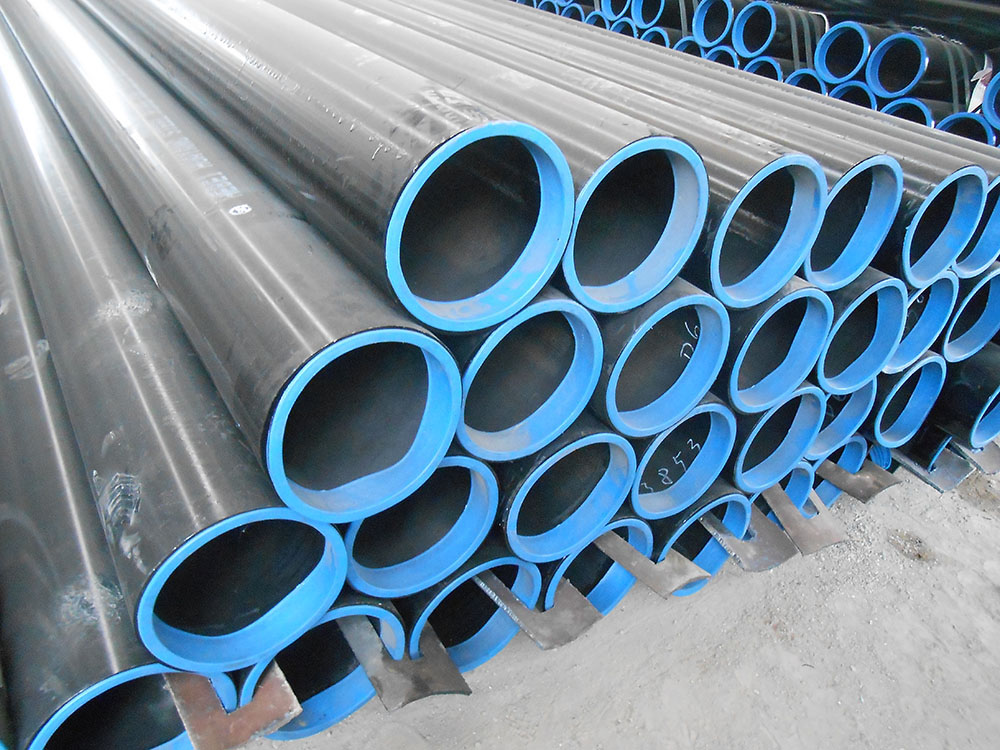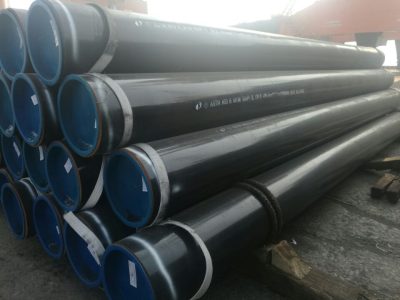

ERW (Electric Resistance Welded) steel pipes are manufactured using the process of high-frequency induction welding. Here are some of the product details of ERW steel pipes:
Size: ERW steel pipes can be produced in a range of sizes from 1/2 inch to 24 inches in diameter.
Thickness: The thickness of ERW steel pipes can range from 1.5mm to 12mm.
Length: ERW steel pipes are typically produced in standard lengths of 6 meters, but they can also be produced in custom lengths to meet specific customer requirements.
Material: ERW steel pipes can be produced from a variety of materials, including carbon steel, stainless steel, and alloy steel.
Surface Finish: ERW steel pipes can be produced with a range of surface finishes, including black, bare, pickled and oiled, and galvanized.
Application: ERW steel pipes are commonly used in a variety of applications, including oil and gas transportation, water supply, and structural applications such as scaffolding and fencing.
Advantages: ERW steel pipes have several advantages over other types of pipes, including their high strength-to-weight ratio, ease of installation, and cost-effectiveness.
Standards: ERW steel pipes are produced according to various international standards, such as API 5L, ASTM A53, and EN 10219.
Quality Control: ERW steel pipes undergo strict quality control procedures during production to ensure that they meet the required specifications for dimensions, surface finish, and mechanical properties.
In summary, ERW steel pipes are versatile and widely used in a range of applications due to their cost-effectiveness, ease of installation, and high strength-to-weight ratio. They can be produced in various sizes, thicknesses, and materials, and undergo strict quality control procedures during production to ensure their performance and reliability.
ERW (Electric Resistance Welded) steel pipes are manufactured using the process of high-frequency induction welding. Here are the specifications of ERW steel pipes:Size: ERW steel pipes can be produced in a range of sizes from 1/2 inch to 24 inches in diameter.
Thickness: The thickness of ERW steel pipes can range from 1.5mm to 12mm.
Length: ERW steel pipes are typically produced in standard lengths of 6 meters, but they can also be produced in custom lengths to meet specific customer requirements.
Material: ERW steel pipes can be produced from a variety of materials, including carbon steel, stainless steel, and alloy steel.
Surface Finish: ERW steel pipes can be produced with a range of surface finishes, including black, bare, pickled and oiled, and galvanized.
End Finish: ERW steel pipes can have different end finishes, including plain ends, beveled ends, and threaded ends.
Standards: ERW steel pipes are produced according to various international standards, such as API 5L, ASTM A53, EN 10219, and DIN 2458.
Manufacturing Process: ERW steel pipes are manufactured using high-frequency induction welding technology, where a current is passed through the edges of the steel strip, causing them to heat and fuse together.
Quality Control: ERW steel pipes undergo strict quality control procedures during production to ensure that they meet the required specifications for dimensions, surface finish, and mechanical properties.
In summary, ERW steel pipes are versatile and widely used in a range of applications due to their cost-effectiveness, ease of installation, and high strength-to-weight ratio. They can be produced in various sizes, thicknesses, and materials, and undergo strict quality control procedures during production to ensure their performance and reliability.
ERW (Electric Resistance Welded) steel pipes are manufactured using the process of high-frequency induction welding. Here are the standards that ERW steel pipes comply with:
API 5L: This is a standard set by the American Petroleum Institute (API) for steel pipes used in the transportation of oil and natural gas. ERW steel pipes that comply with API 5L are used in various applications, including pipeline transportation systems, water supply, and general-purpose structural applications.
ASTM A53: This is a standard set by the American Society for Testing and Materials (ASTM) for steel pipes used in various applications, including water supply, plumbing, and HVAC systems. ERW steel pipes that comply with ASTM A53 are commonly used in these applications.
EN 10219: This is a standard set by the European Committee for Standardization (CEN) for cold-formed welded structural hollow sections of non-alloy and fine grain steels. ERW steel pipes that comply with EN 10219 are commonly used in structural applications, such as building frames and supports.
DIN 2458: This is a standard set by the German Institute for Standardization (DIN) for welded steel pipes and tubes. ERW steel pipes that comply with DIN 2458 are commonly used in a range of applications, including industrial and civil engineering, scaffolding, and general structural purposes.
BS 1387: This is a standard set by the British Standards Institution (BSI) for steel tubes and tubulars suitable for screwing to BS 21 pipe threads. ERW steel pipes that comply with BS 1387 are commonly used in water supply and heating systems.
In summary, ERW steel pipes comply with various international standards set by reputable organizations, such as API, ASTM, EN, DIN, and BS. These standards ensure that the pipes meet the required specifications for dimensions, mechanical properties, and surface finish, and are suitable for various applications in different industries.
ERW (Electric Resistance Welded) steel pipes are manufactured using high-frequency induction welding technology. Here are the surface finishes that can be applied to ERW steel pipes:
Black: ERW steel pipes with a black surface finish have been left uncoated and untreated after the welding process. They are commonly used for non-corrosive applications where a rust-free finish is not required.
Bare: ERW steel pipes with a bare surface finish have been cleaned and coated with a light oil to prevent corrosion during storage and transportation. They are commonly used in water supply and plumbing applications.
Pickled and Oiled: ERW steel pipes with a pickled and oiled surface finish have been treated with an acid solution to remove the mill scale and rust, followed by an oil coating to prevent corrosion. They are commonly used in structural and mechanical applications.
Galvanized: ERW steel pipes with a galvanized surface finish have been coated with a layer of zinc to protect against corrosion. They are commonly used in applications where the pipes will be exposed to moisture and other corrosive substances, such as water supply, HVAC systems, and outdoor structures.
Painted: ERW steel pipes can also be painted with various colors and coatings to provide additional protection against corrosion and to improve their appearance. Painted ERW steel pipes are commonly used in architectural and decorative applications.
In summary, ERW steel pipes can be produced with a range of surface finishes, including black, bare, pickled and oiled, galvanized, and painted. The choice of surface finish depends on the application requirements, such as corrosion resistance, appearance, and durability.
ERW (Electric Resistance Welded) steel pipes are commonly used in a wide range of industries, including oil and gas, construction, plumbing, and mechanical engineering. Here are some common packing methods for ERW steel pipes:
In Bundles: ERW steel pipes can be packed in bundles with steel straps or nylon slings. The pipes are aligned and stacked in a crisscross pattern, and then the bundles are secured with straps or slings. This method is suitable for small-diameter pipes and allows for easy handling and transportation.
In Bulk: ERW steel pipes can also be packed loose in bulk in a container or on a flatbed truck. This method is suitable for larger quantities of pipes and allows for efficient loading and unloading.
In Wooden Crates: ERW steel pipes can be packed in wooden crates for added protection during transportation. The pipes are first packed in bundles, and then the bundles are placed in wooden crates and secured with steel straps. This method is suitable for larger-diameter pipes and ensures that the pipes are well-protected during transit.
In Plastic Caps: ERW steel pipes can also be packed with plastic caps on both ends to protect the threads and prevent damage to the pipes during handling and transportation. This method is commonly used for threaded pipes that will be screwed into fittings or couplings.
Customized Packing: ERW steel pipes can be packed in a variety of other ways based on the customer’s requirements. For example, pipes can be packed with labels, barcode tags, or inspection reports to aid in inventory control and quality assurance.
In summary, ERW steel pipes can be packed in various ways depending on the size, quantity, and application requirements. Common packing methods include bundling, bulk packing, wooden crates, plastic caps, and customized packing. These methods ensure that the pipes are well-protected during transportation and arrive at their destination in good condition.


